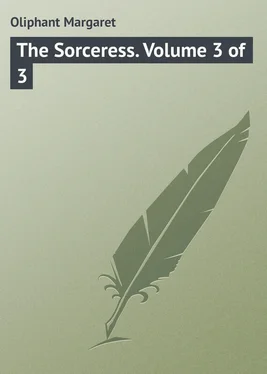Margaret Oliphant - The Sorceress. Volume 3 of 3
Здесь есть возможность читать онлайн «Margaret Oliphant - The Sorceress. Volume 3 of 3» — ознакомительный отрывок электронной книги совершенно бесплатно, а после прочтения отрывка купить полную версию. В некоторых случаях можно слушать аудио, скачать через торрент в формате fb2 и присутствует краткое содержание. Жанр: foreign_prose, на английском языке. Описание произведения, (предисловие) а так же отзывы посетителей доступны на портале библиотеки ЛибКат.
- Название:The Sorceress. Volume 3 of 3
- Автор:
- Жанр:
- Год:неизвестен
- ISBN:нет данных
- Рейтинг книги:5 / 5. Голосов: 1
-
Избранное:Добавить в избранное
- Отзывы:
-
Ваша оценка:
- 100
- 1
- 2
- 3
- 4
- 5
The Sorceress. Volume 3 of 3: краткое содержание, описание и аннотация
Предлагаем к чтению аннотацию, описание, краткое содержание или предисловие (зависит от того, что написал сам автор книги «The Sorceress. Volume 3 of 3»). Если вы не нашли необходимую информацию о книге — напишите в комментариях, мы постараемся отыскать её.
The Sorceress. Volume 3 of 3 — читать онлайн ознакомительный отрывок
Ниже представлен текст книги, разбитый по страницам. Система сохранения места последней прочитанной страницы, позволяет с удобством читать онлайн бесплатно книгу «The Sorceress. Volume 3 of 3», без необходимости каждый раз заново искать на чём Вы остановились. Поставьте закладку, и сможете в любой момент перейти на страницу, на которой закончили чтение.
Интервал:
Закладка:
Margaret Oliphant
The Sorceress, v. 3 of 3
CHAPTER I
When Charlie Kingsward fled from Oxford, half mad with disappointment and misery, he had no idea or intention about the future left in his mind. He had come to one of those strange passes in life beyond which the imagination does not go. He had been rejected with that deepest contumely which takes the aspect of the sweetest kindness, when a woman affects the most innocent suspicion at the climax to which, consciously or unconsciously, she has been working up.
“Oh, my poor boy, was that what you were thinking of?” There is no way in which a blow can be administered with such sharp and keen effect. It made the young man’s brain, which was only an ordinary brain, and for some time had exercised but small restraining power upon him in the hurry and sweep of his feelings, reel. When he pulled the door upon him of those gardens of Aminda, that fool’s paradise in which he had been wasting his youth, and which were represented in his case by a very ordinary suburban garden in that part of Oxford called the Parks, his rejected and disappointed passion had every possible auxiliary emotion to make it unbearable. Keen mortification, humiliation, the sharp sense of being mocked and deceived; the sudden conviction of having given what seemed to the half-maddened boy his whole life, for nothing whipped him like the lashes of the Furies. In most of the crises of life the thought what to do next occurs with almost the rapidity of lightning after a great catastrophe, but Charlie felt as if there was nothing beyond. The whole world had crumbled about him. There was no next step; his very footing had failed him. He rushed back to his rooms by instinct, as a wounded creature would rush to its lair, but on his way was met by eager groups returning from the “Schools,” in which he ought to have been, discussing among each other the stiffness of the papers, and how they had been done. This would scarcely add to his pain, but it added to that sickening effort of absolute failure of the demolition of everything around and before him, which was what he felt the most. They made the impossible more impossible still, and cut off every retreat. When he stood in his room, amid all the useless books which he had not opened for days or weeks, and heard the others mounting the staircase outside his locked door, it seemed to the unhappy young man as though the floor under his feet was the last spot on which standing ground was possible, and that beyond and around there was nothing but chaos. For what reason and on what impulse he rushed to London it would be difficult to tell. He had little money, few friends – or rather none who were not also the friends of his family – no idea or intention of doing anything.
“Perhaps the world will end to-night.”
He did not even think so much as that, though perhaps it was in some sort the feeling in his mind. Yet no suggestions of suicide, or of anything that constitutes a moral suicide, occurred to him. These would have been something definite, they would have provided for a future, but Charlie was stupefied and had none. He had not so much sense of any resource as consisted in a pistol or a plunge into the river. He flung himself into the train and went to London, because after a time the sound of his comrades, or of those who ought to have been his comrades, became intolerable to him. They kept pacing, rushing up and down the staircase, calling to each other. One or two, indeed, talked at his own closed door, driving him into a silent frenzy. As soon as they were gone he seized a travelling bag, thrust something, he did not know what, into it, and fled – to the desert – to London, where he would be lost and no one would drive him frantic by calling to him, by making believe that there was something left in life.
It occurred to him somehow, by force of that secondary consciousness which works for us when our minds are past all exertion, to fling himself into the corner of a third-class carriage as the place where he was least likely to meet anyone he knew, though indeed the precaution was scarcely necessary, since he could not have recognised anyone, as he sat huddled up in his corner, staring blankly at the landscape that flew past the window and seeing nothing. When he arrived in the midst of the din and bustle of the great railway station, he fled once more through the crowd into the greater crowd outside, clutching instinctively at the bag which lay beside him, but seeing no one, nor whither he went nor where he was going. He walked fast, and in a fierce unconsciousness pushing his way through everything, and though he had in reality no aim, took instinctively the way to his father’s house – his home – though it was at that time no home for him, being occupied by strangers. When he got into the park a vague recollection of this penetrated through the maze in which he was enveloped, and for a moment he paused, but then went on walking at the same pace, making the circuit of the park which lay before him in the mists of the afternoon, the frosty sun setting, the hay taking a rosy tint. He went all round the silences of the half-deserted walks, beginning to feel vaguely the strange desolate sentiment of not knowing where to go, though only in the secondary phase of his consciousness. Until all at once his strength seemed to fail him, his limbs grew feeble, his steps slow, and he stopped short, mechanically, as he had walked, not knowing why, and flung himself upon a bench, where he sat long, motionless, as if that had now become the only thing solid in the world and there was no step remaining to him beyond.
A young man, though he may have numberless friends, may yet make a despairing transit like this from one place to another through the midst of a crowd without being seen by anyone who knows him; if the encounters of life are wonderful, the failures to encounter, the manner in which we walk alone with friends on all hands, and in our desperate moments, when help is most necessary, do not meet or come within sight of any, is equally wonderful. The Kingswards had a large circle of acquaintance, and Charlie himself had the numberless intimates of a public school boy, a young university man, acquainted with half the youth of his period – yet nobody saw him, except one to whom he would scarcely have accorded a salutation in ordinary circumstances. Aubrey Leigh, who had been so strangely and closely connected for a moment with the Kingsward family, and then so swiftly and peremptorily cut off, arrived in London from a short visit to a suburban house by the same train which brought Charlie, and caught sight of him as he jumped out of his compartment with his bag in his hand. A very cool, self-possessed, and trim young man young Kingsward had always appeared to the other, with whose brightest and at the same time most painful recollections his figure was so connected. To see him now suddenly, with that air of desperation which had triumphed over all his natural habits and laws, that abstracted look, clutching his bag, half leaping, half stumbling out of the carriage, going off at a swift, unconscious pace, pushing through every crowd, filled Aubrey with surprise which soon turned into anxiety. Charlie Kingsward, with a bag in his hand, rushing through the London streets conveyed an entirely new idea to the minds of the spectators. What such an arrival would have meant in ordinary circumstances would have been the rattling up of a hansom, the careless calling out of an address, the noisy progress over the stones, of the driver expectant of something more than his fare, and keenly cognisant of the habits of the young gentlemen from Oxford.
Aubrey quickened his own pace to follow the other, whose arrival this time was in such different guise. A sudden terror seized his mind, naturally quite unjustified by the outward circumstances. Was anyone ill? – which meant, was Bee ill? Had anything dreadful happened? A moment’s reflection would have shown that in such a case the hansom would be more needed than usual, as conveying her brother the more quickly to his home. But Aubrey did not pause on probabilities. A moment more would have made him sure of the unlikelihood that Charlie would be sent for in case of Bee’s illness, unless, indeed, the question had been one of life and death.
Читать дальшеИнтервал:
Закладка:
Похожие книги на «The Sorceress. Volume 3 of 3»
Представляем Вашему вниманию похожие книги на «The Sorceress. Volume 3 of 3» списком для выбора. Мы отобрали схожую по названию и смыслу литературу в надежде предоставить читателям больше вариантов отыскать новые, интересные, ещё непрочитанные произведения.
Обсуждение, отзывы о книге «The Sorceress. Volume 3 of 3» и просто собственные мнения читателей. Оставьте ваши комментарии, напишите, что Вы думаете о произведении, его смысле или главных героях. Укажите что конкретно понравилось, а что нет, и почему Вы так считаете.












